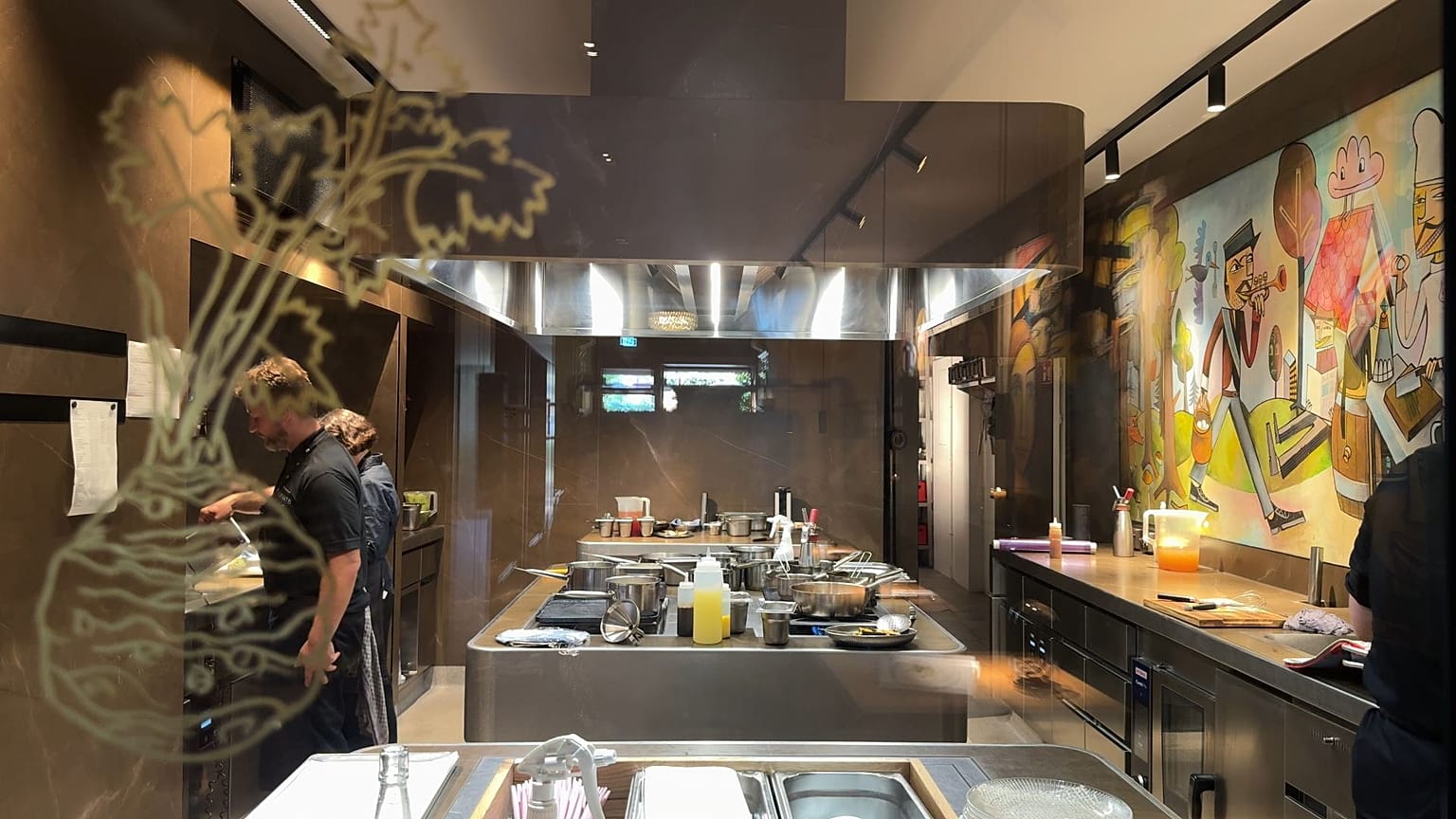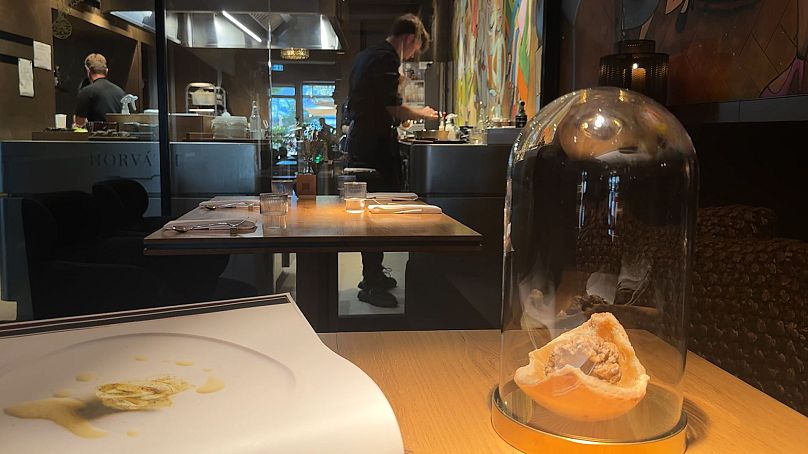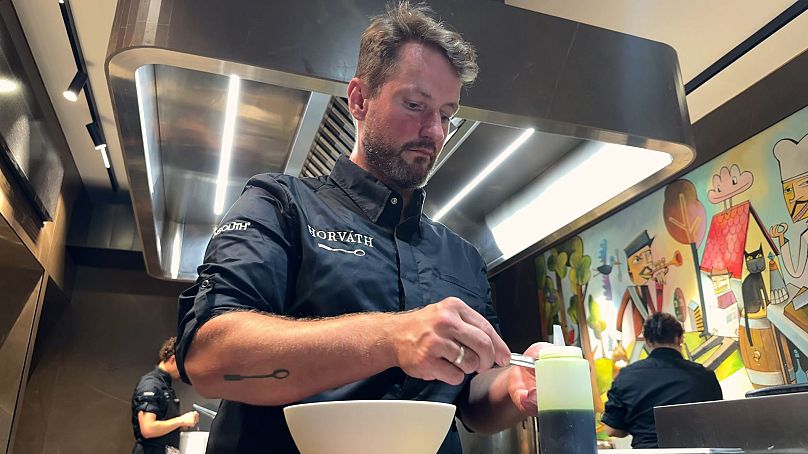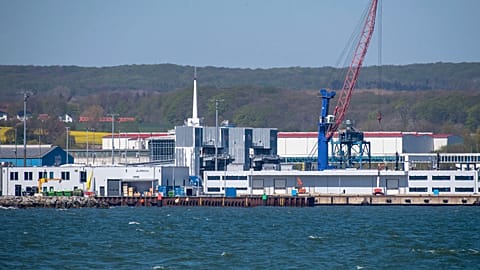Five of the highest-awarded fine dining restaurants in the capital of the EU's strongest economy have shut up shop in the past 12 months. Others are warning of a critical situation. But what's driving this crisis?
In just over two months, the fifth Michelin-starred restaurant in Berlin will serve its final course.
 ADVERTISEMENT
ADVERTISEMENT
 ADVERTISEMENT
ADVERTISEMENT
Ernst has been lauded by restaurant insiders as one of the most exciting places to eat in Europe but is joining four other established fine dining restaurants that have left Berliners hungrier for better days.
Kin Dee already closed in May this year, following in the footsteps of Cordo, NoName, Lode & Stijn (who had a green Michelin star, symbolising their sustainability) at the end of last year. But what exactly is driving the crisis?
Sebastian Frank, head chef at double Michelin-starred restaurant Horváth, said the situation is really serious and that "this is just the beginning".
The team at Horváth begins work at 1:00 pm on Monday until Sunday. They prepare celery, aubergines and other vegetables under Frank's vision and guidance, in an impressive glass-fronted kitchen before a team meeting at 6:00 pm.
Doors open to customers at 6:30 pm, with vegetables acting as the main star of the menu at Horváth.
"In 2010, when I started here, there were only seven Michelin-starred restaurants, and 10 years later, we had 20," Frank told Euronews.
He said the situation has dramatically changed compared to before the pandemic.
"Back then, people were willing to spend their money, but that has significantly changed now, and the market is shrinking again," he said. "This small bubble, as one might call it, is now starting to deflate, and the business — whether it's fine dining or the restaurant industry in general — will begin to regulate itself. Many restaurants will close, the offerings will decrease, and the market will adjust."
Major world events have battered the industry
According to a recent study, around one in 10 restaurants closed across Germany in 2023 alone.
Experts are warning that many more bankruptcies and closures could be on the way after restaurants were hit by soaring inflation before they could fully recover from pandemic closures.
The German hotel and catering association, DEHOGA, already sounded the alarm back in January that restaurants would have to close down after the government brought the restaurant VAT back from 7% to 19% following the pandemic.
Gerrit Buchhorn, managing director of DEHOGA Berlin, said that people have to realise that due to COVID, Russia's full-scale invasion of Ukraine and other major global events, operating costs have changed significantly and they're being felt particularly by restaurants and investors.
"This, in turn, affects prices, and ultimately, one has to be willing to pay. Or rather, the customer has to be willing to pay," he said.
Buchhorn also pointed to dwindling tourism numbers and said that attracting more wealthy tourists could help fine dining particularly.
"Reservation books used to be full, and now you can get a table relatively quickly at such restaurants," he said.
How to save Berlin's fine dining restaurants
Horváth has introduced a smaller seven-course menu at €145, which Frank said has been popular as a way for customers to acquaint themselves with the restaurant. This is especially true for other guest demographics who perhaps are not often on the fine dining circuit.
"We hope, of course, that once people have visited our restaurant, they will return later and opt for the larger menu," he said.
Other fine dining restaurants in Berlin are also trying out similar approaches in offering reduced menus at cheaper prices, in a bid to keep reservations flowing.
But Frank also said that the fact restaurants are closing or facing problems "can't be pinned down to a single cause".
"It's generally due to an expansive financial policy where more and more money is being created, and in the end, it's those at the bottom of the chain who suffer from inflation," he added. "That's a much bigger problem because people can no longer afford to go out to restaurants or treat themselves because this increase in money, this money printing, this inflation just doesn't reach the lower classes."
Both Frank and Buchhorn criticised the government and urged the next administration, which is due to be elected in late 2025, to do more.
Buchhorn suggested a renewed reduction in restaurant VAT.
"This is something that the next federal government should definitely keep in mind. Otherwise, we hope that costs will eventually stabilise so that prices do not have to remain so high," he said.
Frank meanwhile suggested that Germany adopt a restrictive financial policy.
"We need to make deep cuts and save," he said. "The national budget needs to be trimmed, and we all need to save. This will become a bigger issue because those cuts are inevitable. Politicians think in short-term cycles because they want to be re-elected every four years."
He warned that it's clear Germany is "heading for a crash," but added that he thinks the government should have actually left restaurant VAT at 19% rather than reducing it.
"Personally, I think it was total nonsense from the government. We had to deal with it twice," he told Euronews. "First, VAT was reduced, and we were criticised for not passing it on to our customers. Suddenly, there was an impression that we were making a fortune, even though we had massive business losses due to the shutdowns caused by Corona."
Frank said that when the VAT was increased again in January, restaurants had no choice but to pass the costs on to customers.
"And we faced the issue with customers that we were becoming more expensive due to the VAT increase," he said. "This simply casts a bad light on the gastronomy sector, even though, and I have to say this clearly, the fault lay with the government's flawed financial policy."
"And I don't even want to think about the additional costs for the state that arose from all the bookkeeping, tax consultants, and accounting," he said.
A glimpse at Germany's deeper problems?
It's not just the fine dining scene that is suffering: many other restaurants are failing to stay open with rising rents and costs in the German capital.
For many of Berlin's fine dining restaurants, 2023 brought little profit, and it seems that despite the Euro football championship, which Germany hosted, 2024 could also leave the same bitter aftertaste.
"The situation is bad this year," Buchhorn said.
"We will have to accept very significant cuts, and I believe that this is just the beginning. I think something much bigger is coming our way, and in the end, we will have bigger problems than just whether we can go to a restaurant tomorrow or not," Frank concluded.



















